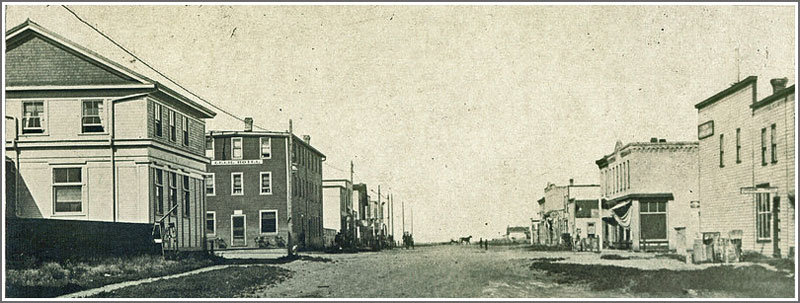|
Strike!
Labour Unrest in Rivers
Labour unrest is not something many small towns are likely to
experience, but with a national operation such as a railway, what
happens in one part of the country affects the staff across the land.
The Grand Trunk Pacific had been in operation on the prairies for only
a few years when a widespread strike hindered operations.
The strike was declared on Oct. 10,1911 by machinists and boilermakers.
Work ceased across the prairies as far as Edmonton. The GTP workers
felt that they deserved the same pay and working condition as their
counterparts in the CP and CN operations. That meant a nine-hour day
and a minimum of 45 ½ cents per hour.
Strikes in a small town where everybody knows their neighbours are
especially disruptive. Things get more personal.
The other complication is that the railway created Rivers. The workers
who came here to work were not entering an established town so much as
creating a town. They were part of it from the beginning, not outsiders
brought in to work. Non-railway townspeople would tend to side with the
workers rather than the management.
But there were bound to be some disputes. In one case some striking
workers took alternate work painting and that was not well received by
those already engaged in that work.
GTP general assistant C. Warman, had this comment (or threat) published
in the local paper: "If the railway is in trouble, the town usually
sides against it. If there is rioting, they are more likely to consort
with the rioters than with the railway and the authorities endeavoring
to preserve the peace...Retention of the shops at Rivers or at any
other terminal of the Grand Trunk Pacific may depend in no small
measure upon the attitude of the people who inhabit these terminal
towns."
In other words, if the town wanted to keep the advantages that go with
having the shops here, they had better be more “understanding”.
The more damaging effects of the strike might never have reached this
small town except for the introduction of strikebreakers from the
outside.
The Brandon Sun on Oct. 18 reported that 100 strikebreakers from
Montreal had reached Rivers and that the new workers would replace
those out at various points. It notes that, “The strikers here are
orderly, but the bringing in of strike breakers is strongly resented.”
The report was an exaggeration as only about ten boilermakers and two
machinists were sent to Rivers, but as one might expect, there were a
few incidents.

By 1911
Rivers was a busy place.
One of the Strikers' in the local press commented that, "we could not
have called a strike at a better time. The Company's power is now in
deplorable condition. Of course, the public is suffering and we are
sorry for the public. . .strike-breakers do not know the meaning of
truth. . . "
Despite these exchanges, the small close-knit community no doubt
expected little more in the way of drama. That made it all the more
shocking when one altercation between a strikebreaker and a striker
escalated into gunfire and death. It seems that a strikebreaker,
when confronted by a striker, produced a pistol, and in the scuffle
that followed shots were fired killing on and injuring another. (See
The Alston Murder Trial).
Such altercations were certainly the exception, and for the most part,
the town weathered the storm by waiting it out.
It took some time, and over a year had gone by before the end was in
sight. In December of 1912 representatives of the GTP strikers,
including William Renton from Rivers, met with the Minister of Labour
in Ottawa about the strike, which had now lasted fourteen months. It
was settled shortly afterwards, with the strikers gaining most of their
demands.
|